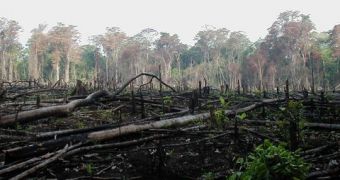Recent studies made public by researchers from the Massachusetts Institute of Technology (MIT) indicate that, as a result of massive deforestations, Indonesia is presently the world's third greenhouse gas emitter.
Apparently, this is because once the trees are cut down, the lands can no longer do their job in capturing and storing at least some of the carbon dioxide released into the atmosphere by various industries and human activities.
One of the MIT specialists involved in this study explains that, as Indonesia's population becomes ever larger and wealthier, most of the country's forests need to be cut down so as to accommodate crops.
Although researchers do not deny the fact that said crops are needed to feed local communities, they do argue that massive deforestation campaigns, which are intended to serve agricultural purposes, might in time lead to a vicious circle that harms both the environment and human society.
Thus, as ENN explains, cutting down trees leads to CO2 building up in the atmosphere.
In turn, this causes global warming to occur, and higher temperatures worldwide mean that agricultural lands will no longer be as productive as they presently are.
Therefore, in order to produce the same quantities of crops they are currently producing, Indonesians would require ever more land and have to resort to deforestation once again.
The same source quotes John Reilly from the MIT, who supposedly argues that “With a larger and wealthier population, both energy and food demand will grow. Absent controls on greenhouse gases, we will see more emissions from fossil-fuel use and from land-use change. The resulting environmental change can reduce crop yields, and require even more land for crops. So this could become a vicious circle.”
Regardless of the fact that this study first and foremost wishes to investigates what is now going on in Indonesia, it is our belief that this could easily turn into an international dilemma unless sustainable development is made a priority for countries worldwide.

 14 DAY TRIAL //
14 DAY TRIAL //